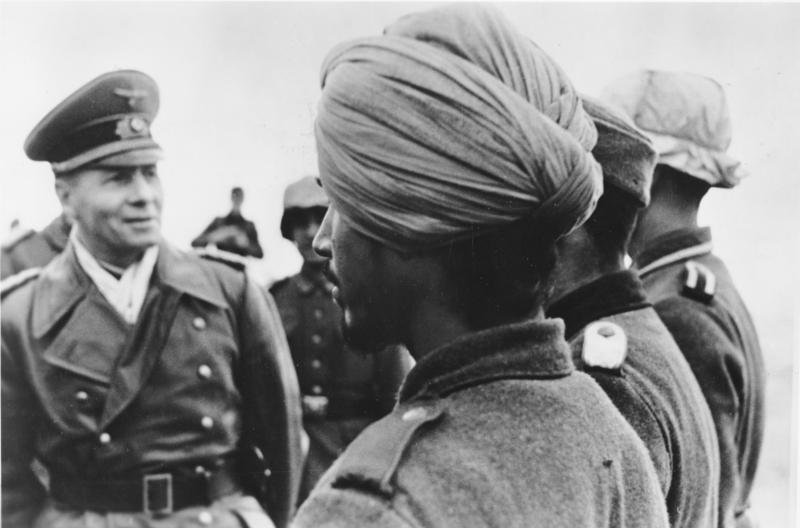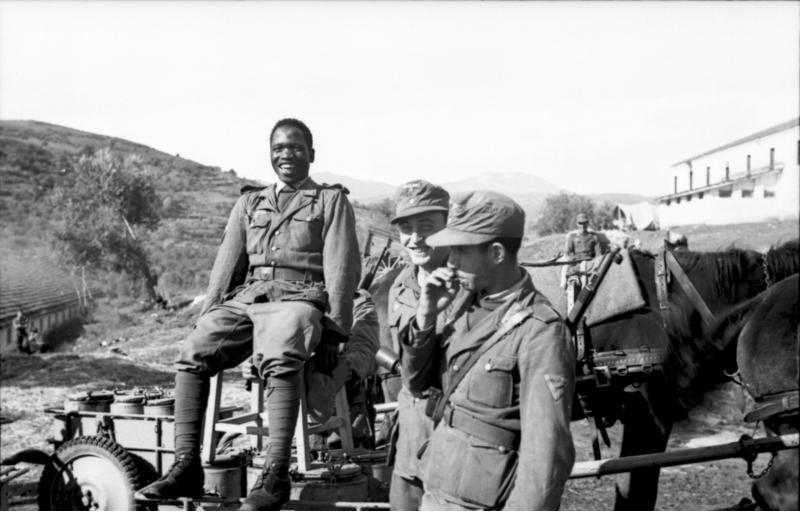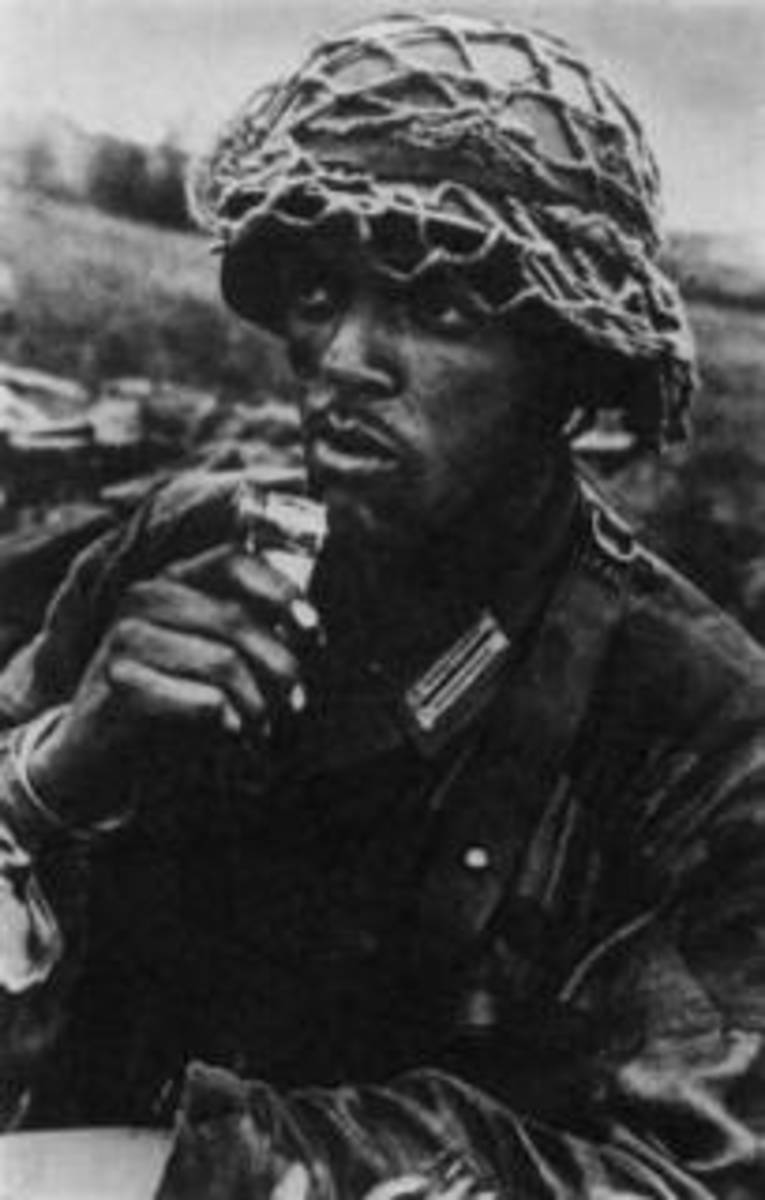Right now, COD:WWII is running its PC Beta, and it's getting mauled through Steam Reviews, partially because people are complaining that you get to play as a black dude while on the Axis side, or some other racist nonsense. This isn't to say that there aren't genuine concerns about game mechanics or PC support or what have you, but I thought it'd be cool to bring up actual, historical context for this stuff, since not many seem to be actually aware of the facts.
During World War II, there were two theaters of war: European and the Pacific. In the European theater, it is well known that the British had many troops pulled from its colonies, whether pressed into service or volunteered. But what many don't know, is that the Germans also had their share of minorities fighting for their side. Probably the most well known are the soldiers of the Indische Legion.
Comprised of both Indian POWs captured from the British and Indian expats living in Germany at the time, these men were Indian nationalists who hoped that by helping the Germans win the war, they'd open the door to push the British out of India once and for all (the Indian National Congress, at this time the leading group pushing for Indian independence, had made a gambit at war's outbreak hoping that the British would agree to independence under the threat of civil unrest at an inopportune time and failed, resulting in their leadership being put under house arrest until the war ended*).
At around 2600 strong at its peak, this regiment saw action in France, had members parachuted into Iran to conduct sabotage, and fought in Italy before surrendering. There is some evidence that implies that the French Moroccan troops that captured them executed several of their members before they were surrendered to the British.
While the Indische Legion had a mixed religious composition of Sikh, Muslim and Hindu members, the 1st Croation were a majority Muslim force with some Catholic members.
This group was mostly deployed to deal with Partisan movements in the Croatian puppet state that the Nazis set up, but also saw action against the Red Army. They were known for their brutality towards Serbs and Jewish civilians. In fact, the reason this division even existed in the first place was due to rampant Anti-Semitism among the Muslim peoples of the region.
The last German led group I'll mention (there are many other foreign born German Waffen-SS elements I'm sure I'm neglecting to mention) is the Free Arab Legion
This group formed for very similar reasons to the Indische Legion, they opposed colonial rule and hoped a German victory would give them independence. They were apparently ineffective; early on the Germans refused to let them take prayer breaks and as a result of high desertion they eventually backed away from that stance. Looks like they ended up spending most of the war hunting partisans in Greece.
As for the Pacific front, that would be an entire book by itself, as the Japanese were notorious for pressing men from conquered nations into battle under their banner. Probably the most notable group is this group of Korean soldiers:
They had been conscripted by the Japanese in the decades leading up to WWII, and in one of the conflicts between Japan and Russia in the 1930s, had been taken captive by the Soviets, who in turn used them on their front lines, only for them to be captured by the Germans once war broke out. They ended up in France, captured by Americans on D-Day.
The only other group I'd mention, for a specific reason I'll mention below, is the Indian National Army, who were an Indian force that fought for the Japanese, for similar reasons as the Indische Legion, and was formed mostly of POWs and expats living in Burma and present-day Malaysia. They're notable, as in their engagements in the Japanese campaign in Burma, they would face off against fellow Indians fighting for the British. While the conflict was between the Allies and the Axis, Indians would end up directly killing each other.
*In reference to Congress being put under house arrest during WWII, this directly lead to partition. Jinnah had fallen out of favor earlier on in the independence movement for opposing Gandhi (he viewed Gandhi's appeals as being too Hindu centered, something that he was afraid would lead to Hindu-first nationalism at the cost of Muslim rights, and he was absolutely right). However, once Congress was suppressed during WWII, he was given an opening by embracing a movement he had earlier dismissed--the creation of a Muslim-state that would be named Pakistan. It was pressure from him and threats of his followers creating violence that led to partition, even if he himself did not want a part of any state that defined itself by the religion of its marjority. In fact after Pakistan was secured, he hoped to create a state where any religion was welcome and had a seat at the table, but his followers did not necessarily agree and his sudden death provided the death stroke to his dream.
During World War II, there were two theaters of war: European and the Pacific. In the European theater, it is well known that the British had many troops pulled from its colonies, whether pressed into service or volunteered. But what many don't know, is that the Germans also had their share of minorities fighting for their side. Probably the most well known are the soldiers of the Indische Legion.
Comprised of both Indian POWs captured from the British and Indian expats living in Germany at the time, these men were Indian nationalists who hoped that by helping the Germans win the war, they'd open the door to push the British out of India once and for all (the Indian National Congress, at this time the leading group pushing for Indian independence, had made a gambit at war's outbreak hoping that the British would agree to independence under the threat of civil unrest at an inopportune time and failed, resulting in their leadership being put under house arrest until the war ended*).
At around 2600 strong at its peak, this regiment saw action in France, had members parachuted into Iran to conduct sabotage, and fought in Italy before surrendering. There is some evidence that implies that the French Moroccan troops that captured them executed several of their members before they were surrendered to the British.
While the Indische Legion had a mixed religious composition of Sikh, Muslim and Hindu members, the 1st Croation were a majority Muslim force with some Catholic members.
This group was mostly deployed to deal with Partisan movements in the Croatian puppet state that the Nazis set up, but also saw action against the Red Army. They were known for their brutality towards Serbs and Jewish civilians. In fact, the reason this division even existed in the first place was due to rampant Anti-Semitism among the Muslim peoples of the region.
The last German led group I'll mention (there are many other foreign born German Waffen-SS elements I'm sure I'm neglecting to mention) is the Free Arab Legion
Black people fighting for the Germans who woulda thunk huh
This group formed for very similar reasons to the Indische Legion, they opposed colonial rule and hoped a German victory would give them independence. They were apparently ineffective; early on the Germans refused to let them take prayer breaks and as a result of high desertion they eventually backed away from that stance. Looks like they ended up spending most of the war hunting partisans in Greece.
As for the Pacific front, that would be an entire book by itself, as the Japanese were notorious for pressing men from conquered nations into battle under their banner. Probably the most notable group is this group of Korean soldiers:
They had been conscripted by the Japanese in the decades leading up to WWII, and in one of the conflicts between Japan and Russia in the 1930s, had been taken captive by the Soviets, who in turn used them on their front lines, only for them to be captured by the Germans once war broke out. They ended up in France, captured by Americans on D-Day.
The only other group I'd mention, for a specific reason I'll mention below, is the Indian National Army, who were an Indian force that fought for the Japanese, for similar reasons as the Indische Legion, and was formed mostly of POWs and expats living in Burma and present-day Malaysia. They're notable, as in their engagements in the Japanese campaign in Burma, they would face off against fellow Indians fighting for the British. While the conflict was between the Allies and the Axis, Indians would end up directly killing each other.
*In reference to Congress being put under house arrest during WWII, this directly lead to partition. Jinnah had fallen out of favor earlier on in the independence movement for opposing Gandhi (he viewed Gandhi's appeals as being too Hindu centered, something that he was afraid would lead to Hindu-first nationalism at the cost of Muslim rights, and he was absolutely right). However, once Congress was suppressed during WWII, he was given an opening by embracing a movement he had earlier dismissed--the creation of a Muslim-state that would be named Pakistan. It was pressure from him and threats of his followers creating violence that led to partition, even if he himself did not want a part of any state that defined itself by the religion of its marjority. In fact after Pakistan was secured, he hoped to create a state where any religion was welcome and had a seat at the table, but his followers did not necessarily agree and his sudden death provided the death stroke to his dream.














